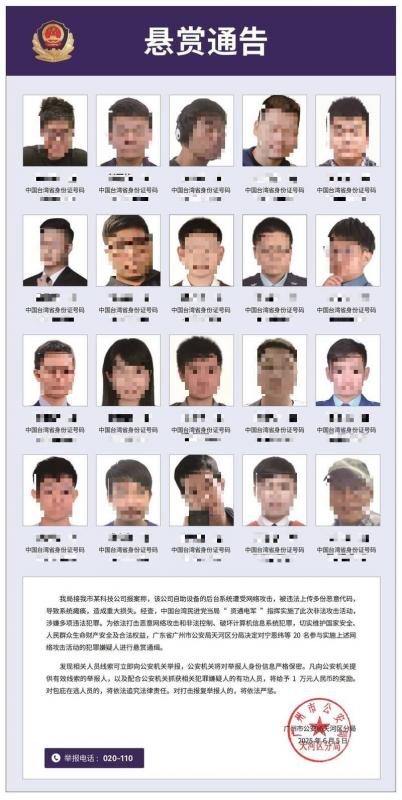Authorities in southern China have offered an undisclosed bounty for more than 20 people they say are linked to Taiwan and suspected of cyberattacks in China, the official Xinhua news agency said, accusations that Taipei denied.
The public security bureau in the Chinese city of Guangzhou put up a bounty for the suspects, Xinhua reported, publishing their photographs, names and national ID numbers.
A bounty of 10,000 yuan (US$1,388) was offered for each person on the list, one of whom was named as Ning Enwei (寧恩緯).

Photo courtesy of Xinhua news agency
Chinese authorities accused Taiwan of organizing, planning and premeditating attacks on key sectors such as military, aerospace, government departments, energy and transportation, maritime affairs, as well as science and technology research firms in China, including Hong Kong and Macau, Xinhua reported.
Xinhua, citing a cybersecurity report, said that the Taiwan "information, communication and digital army" has cooperated with US anti-Chinese forces to conduct public opinion and cognitive warfare against China, secretly instigate revolution and attempt to disrupt public order in China.
In New Taipei City, the Information, Communications and Electronic Force Command said in a statement that it was not carrying out any "corporate cyberattacks," and that China's offers of a bounty highlighted "the rude and unreasonable attitude of the Chinese communists in intimidating and coercing Taiwanese."
"Recent statements by the European Union, the United States and the Czech Republic condemning the Chinese communists' hacking organizations for carrying out cyberattacks prove that the Chinese communists are not only a regional troublemaker, but a common threat to the global Internet," the agency said.
Claims by the public security bureau in Guangzhou that Chinese enterprises were facing cyberattacks were promoted by the Chinese state media last month, the agency said.
It is obviously a manipulation aimed to intimidate and coerce Taiwanese, it said.
The military is determined to safeguard Taiwan’s digital territory, including against cyberattacks, it said.
A senior Taiwanese security official told reporters the Chinese allegations were invented, adding that Beijing was trying to shift the focus from Czech and European scrutiny over alleged Chinese hacking activities there.
"They fabricated a false narrative to shift the focus. It's typical behavior of the Chinese Communist Party," the official said, speaking on condition of anonymity given the sensitivity of the matter. "No amount of storytelling can change the fact that Beijing is not only a regional troublemaker, but also a common international threat to the online world."
China also said that Taiwan had long-standing cooperation with the US National Security Agency, the CIA and other intelligence agencies for the US' "Asia-Pacific Strategy," calling it Taiwan's attempt to gain independence through relying on Washington.
"The US intelligence department has long provided personnel training and technical equipment support for Taiwan's 'information, communication and digital army,' and many police stations have sent 'hunting' teams to Taiwan, to launch cyberattacks on China," an account linked to Chinese state television wrote on social media.
Last week authorities in Guangzhou, the capital of Guangdong Province, attributed a cyberattack on an unnamed technology company to Taiwan's government, saying that the Democratic Progressive Party supported the "overseas hacker organization" responsible.
The accusation prompted Taiwan to accuse China of peddling false information, saying it was China that was carrying out hacking against the nation.
Additional reporting by CNA and Fion Khan

Nipah virus infection is to be officially listed as a category 5 notifiable infectious disease in Taiwan in March, while clinical treatment guidelines are being formulated, the Centers for Disease Control (CDC) said yesterday. With Nipah infections being reported in other countries and considering its relatively high fatality rate, the centers on Jan. 16 announced that it would be listed as a notifiable infectious disease to bolster the nation’s systematic early warning system and increase public awareness, the CDC said. Bangladesh reported four fatal cases last year in separate districts, with three linked to raw date palm sap consumption, CDC Epidemic Intelligence

Two Taiwanese prosecutors were questioned by Chinese security personnel at their hotel during a trip to China’s Henan Province this month, the Mainland Affairs Council (MAC) said yesterday. The officers had personal information on the prosecutors, including “when they were assigned to their posts, their work locations and job titles,” MAC Deputy Minister and spokesman Liang Wen-chieh (梁文傑) said. On top of asking about their agencies and positions, the officers also questioned the prosecutors about the Cross-Strait Joint Crime-Fighting and Judicial Mutual Assistance Agreement, a pact that serves as the framework for Taiwan-China cooperation on combating crime and providing judicial assistance, Liang

The manufacture of the remaining 28 M1A2T Abrams tanks Taiwan purchased from the US has recently been completed, and they are expected to be delivered within the next one to two months, a source said yesterday. The Ministry of National Defense is arranging cargo ships to transport the tanks to Taiwan as soon as possible, said the source, who is familiar with the matter. The estimated arrival time ranges from late this month to early next month, the source said. The 28 Abrams tanks make up the third and final batch of a total of 108 tanks, valued at about NT$40.5 billion

Reports of Taiwanese going missing, being detained or interrogated, or having their personal liberties restricted in China increased about fourfold annually last year, the Mainland Affairs Council (MAC) said yesterday. Last year, 221 Taiwanese who traveled to China were reported missing, were detained and interrogated, or otherwise had their personal freedom restricted, up from 55 the previous year, the council said. Reopening group tours to China would be risky, as it would leave travelers with no way to seek help through official channels after Beijing shut down dialogue between the associations tasked with handling cross-strait tourism, the MAC said. Taipei’s Taiwan Strait Tourism